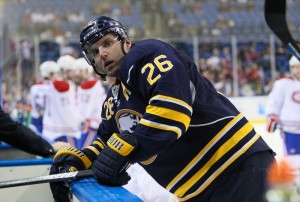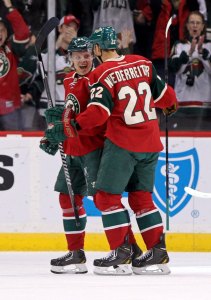
The 2014 NHL trade deadline is less than one week away. As we approach the deadline, Minnesota Wild General Manager Chuck Fletcher will have some decisions to make to tune his club up for the playoff race. Despite an assortment of offensively gifted forwards, the Wild have had difficulty lighting the lamp this season. The Wild will need a strong effort down the stretch to maintain their Wild Card positioning in the West to qualify for the playoffs for the second straight season.
There has been a lot of speculation for the offseason when Thomas Vanek becomes an unrestricted free agent. Many believe he has interest in signing with Minnesota this offseason. While at this point it is all speculation, with the deadline looming many have wondered if now is the time for the Wild to acquire Vanek?
Obviously, any deal made by Fletcher will have to make sense under the salary cap and from a value perspective. The Wild can easily just wait until the offseason to make a run at Vanek without having to give anything up in return. However, there is no doubt that the addition of Vanek would be an instant upgrade to the Wild’s offense. The Wild have a decent shot at making the playoffs and bringing Vanek in at the deadline would add a potent sniper to the Wild.
On the flip side, giving up assets for Vanek at this point when the Wild can make him an offer during the offseason might not make sense. Many of Fletcher’s critics felt he overpaid at last year’s deadline for forward Jason Pominville. Fletcher acquired Pominville and a 2014 4th round pick from the Buffalo Sabres in exchange for goaltender Matt Hackett, forward Johan Larsson, a 1st round pick in the 2013 draft and a 2nd round pick in the 2014 draft.
It doesn’t make sense for Fletcher to part with a similar package for Vanek and Isles GM Garth Snow will likely be looking for big value in return. However, if the price is right, there are many reasons why the Wild should bring Vanek to Minnesota at this year’s deadline.

Vanek is a Potent Weapon on Offense
Thomas Vanek has had a stellar NHL career which had humble beginnings. As a member of the Gophers at University of Minnesota for two seasons, Vanek scored an impressive fifty-seven goals and fifty-six assists in just eight-three games. In the 2002-2003 season, Vanek’s stellar play helped the Gophers win a national championship while it earned him NCAA Froze Four Tournament MVP honors and he was named to the Froze Four All-Tournament Team. He was drafted fifth overall in the 2003 NHL Entry Draft by the Buffalo Sabres.
Vanek spent the lost lockout season playing for the Buffalo’s AHL affiliate, the Rochester Americans. Vanek quickly became a fan favorite in Rochester where he averaged close to a point per game in the 2004-2005 season. He finished the year scoring forty-two goals along with twenty-six helpers in seventy-four games.
His forty-two goals were the most ever scored by a rookie in the history of the Rochester Americans. Vanek played a leading role on a team that set several franchise records and finished with a 51-19-6-4 record.
After his time in the AHL, Thomas Vanek would spend his first eight NHL seasons with the Buffalo Sabres. Vanek put up one hundred and thirty-two points in his first two seasons. In the 2006-2007 season, Vanek led the league in plus/minus with a +47 and he was a fundamental part of a dynamic Sabres offense that scored three hundred and eight goals – twenty more goals than the next closest team.
Thomas Vanek signed his current contract in what many have considered to be a blunder by former Sabres GM Darcy Regier. The Sabres let co-captains Chris Drury and Daniel Briere leave via unrestricted free agency in the summer of 2007. The club also nearly lost Vanek that summer because, as it seemed, the organization was not taking negotiations very seriously. That opened Vanek up to offer sheets and the Edmonton Oilers threw him a contract they thought was too rich for the Sabres. Buffalo chose to match the offer from the Oilers, and Vanek became the Sabres’ highest paid player banking $10 million in the first year of his deal.
While there was much optimism in Buffalo after Vanek’s first two seasons, after signing his monster contract the fans had very high expectations. Vanek’s game was critiqued by many on a nightly basis for better or worse. Many pointed to his giant contract during stretches when he struggled.
Despite the criticism, Vanek performed well for the Sabres. He averaged at least thirty goals and sixty points each season for the next five seasons. His success in Buffalo always was tempered for fans by his large contract and many debated whether or not he lived up to it to the money. At the start of this season, Vanek was named co-captain of the Sabres along with forward Steve Ott. In the early-going, however, the club dealt him to the New York Islanders as part of their rebuilding efforts.
In thirteen games with the Sabres, Vanek scored four goals and had five helpers. He has played in forty-four games for the Islanders this year and has nearly a point per game with fifteen goals and twenty-five assists. Vanek reportedly has rejected a contract extension from the Islanders so it is highly likely that he will be moved at the deadline.
In giving up big value for Vanek earlier this year, Garth Snow, the Isles GM, will be looking for a big return to recoup assets. The price for Vanek will likely be high so it seems unlikely that the Wild will pursue a trade for him at the deadline. However, if the price for Vanek did drop, the forward would provide an instant upgrade to the Wild offense.

What He Can Do for the Wild
Vanek is a gifted offensive talent that could really help the Wild in the playoff hunt. The Wild rank in the bottom half of the league in goal scoring. Minnesota’s one hundred forty-five goals puts the club in twenty-fifth place in the NHL. By contrast, the Wild have allowed one hundred forty-seven goals against. Out of the teams in the Western Conference that are currently in a playoff spot, the Wild are the only team with a negative goal differential.
The addition of Thomas Vanek to the Wild roster would give an immediate boost to the club’s offensive power. While members of the Buffalo Sabres, Thomas Vanek and current Wild forward Jason Pominville were line mates and proved to be a dynamic duo on offense. Vanek and Pominville were very vocal on the ice as line mates and frequently helped each other appear on the score sheet. They both can read plays very well and, more often than not, seemed to find one another in the right place at the right time.
In addition to his offensive skills, on intangible of Vanek’s game is his strong will to win. While he had many critics in Buffalo, perhaps Vanek’s biggest critic is himself. Vanek is a tireless worker who constantly holds himself accountable. When he misses an opportunity, fans will often see him voice his frustrations as he heads to the bench. His fire and passion for the game is infectious and it often leads him to follow up a missed opportunity with a great play.

Does a Trade for Vanek Make Sense for the Wild?
In order for the Wild to acquire Vanek at the deadline, the situation will need to be right in terms of the Islanders’ asking price and the salary cap. Isles’ GM Garth Snow gave up a first and a second round pick for Vanek earlier this season. With prices escalating at the deadline, it is likely that the asking price for Vanek will be really high. Chuck Fletcher gave up a lot of assets to land Jason Pominville last season so it is unlikely that he will do the same at this year’s deadline – especially when he can make an offer to Vanek during the offseason.
However, with reports indicating that Vanek rejected a contract extension from the Islanders, Snow needs to move the star forward or risk losing him for nothing through free agency. Clubs that are interested in acquiring Vanek’s services may play the waiting game to try to get the price down. If Isles’ GM Garth Snow is interested in any of the Wild’s assets, maybe Fletcher can pull off a deal that won’t be too costly. While this is all possible it doesn’t seem very practical. The team who lands Vanek will likely be paying a pretty penny for the star sniper.
Thomas Vanek's annualized cap hit (AAV) for an acquiring team is $5.75M. #Sabres are retaining 19.5% or $1,392,857 of $7,142,857 total.
— CapGeek (@capgeek) February 4, 2014
Another issue to consider is the salary cap. Vanek has a $7.125 million cap hit but some of his salary is being paid by the Buffalo Sabres. Any trade involving the Islanders’ forward would have to take this into account. Making it work under the salary cap is no easy task and it might be too daunting for the Wild to accomplish. According to Capgeek.com, the Wild will have a projected $5.7million in cap space to work with at the trade deadline.
One possible scenario to create more space is to deal forward Dany Heatley who is also on an expiring contract. Heatley has had a disappointing season where he’s scored just eleven goals and thirteen assists in fifty-nine games. In a contract year, the Wild hoped he would be more of a factor for them but he has not answered the bell. Heatley won’t be around after next season so IF (and that’s a big IF) the Wild can deal him to clear cap space, perhaps that can open up room for Vanek.

The Wild Bottom Line
It will be very difficult for Fletcher to add Vanek at the deadline. While Vanek would instantly add to Minnesota’s offensive threat, barring a lower price, it is best for the Wild to wait for the offseason rather than giving up assets to acquire him at the deadline.
However, if the playoffs began today the Wild would qualify as a Wild Card team. An on-going issue for the Wild this season has been goal scoring and this issue also plagued them in last year’s playoffs. Minnesota scored just seven goals in four playoff games against the Chicago Blackhawks which led to an early exit.
Vanek has thirty-six games of playoff experience including two Eastern Conference Final appearances. He’s found the back of the net fifteen times and has two game winning goals under his belt in the playoffs. This experience could be extremely valuable to the Wild’s young core and potentially put the club over the top.
The decision rests with Chuck Fletcher in what he is willing to sacrifice and what is possible with the salary cap. Vanek in Minnesota at the deadline might be a pipe dream but time will tell if there’s a way Fletcher can make it a reality.
[See Also: The 2013-2014 Minnesota Wild: How They Were Built]
What do you think about the Wild taking a run at Vanek? Does it have a chance of happening at the deadline or do you think it is better left for the offseason? Leave your comments below and thanks for reading!